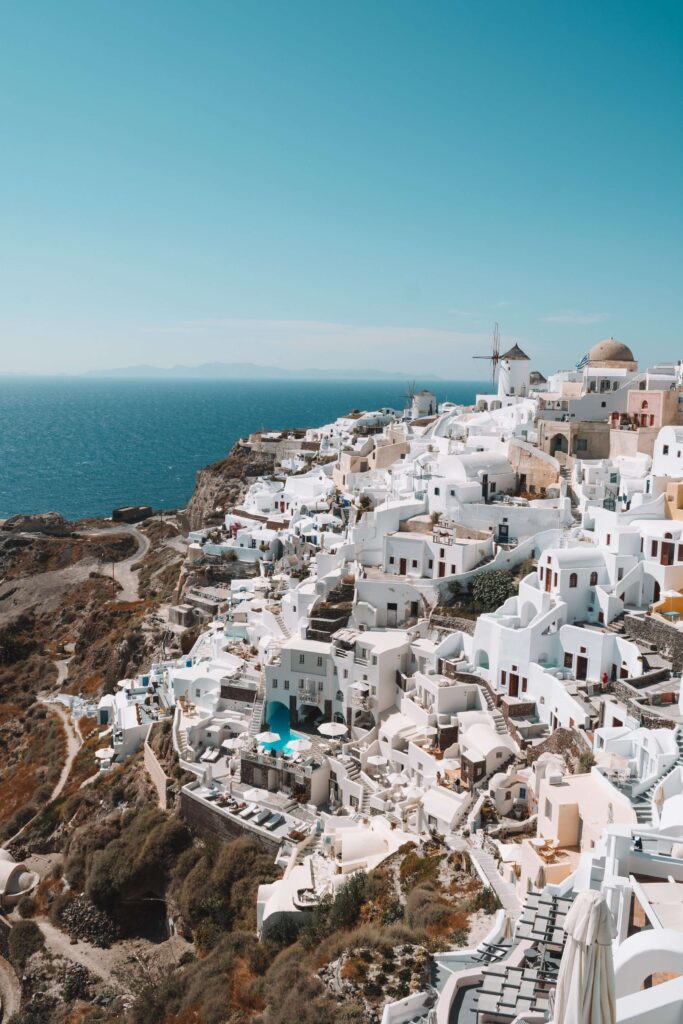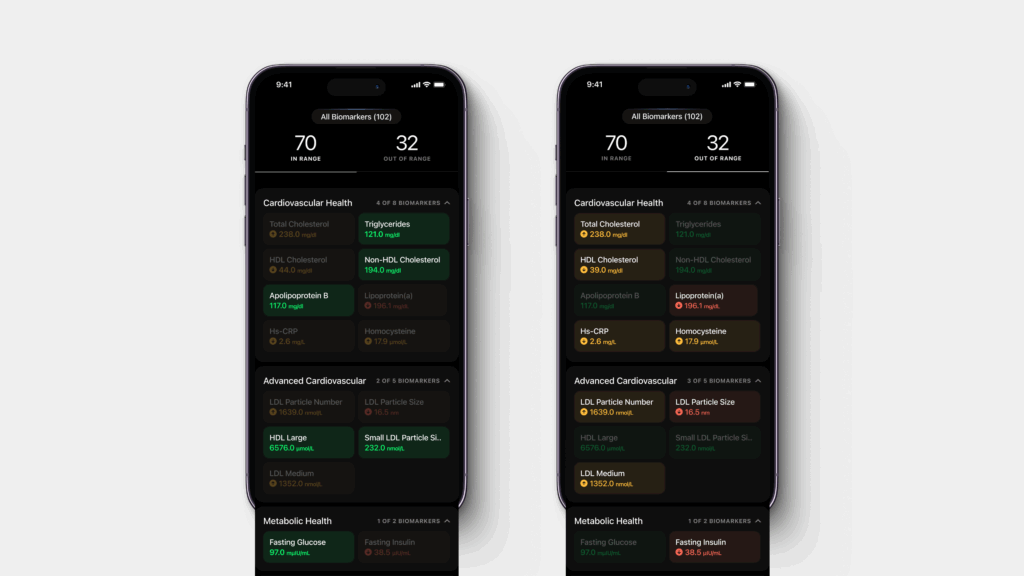Blue zones are geographic regions of the world where some of the oldest people are known to reside. They have the highest concentration of centenarians and supercentenarians on earth. Epidemiologist Gianni Pes and demographer Michel Poulain first identified blue zones while conducting a study on mortality in Sardinia, Italy. They drew blue concentric circles on a map, highlighting areas associated with longevity. In collaboration with National Geographic, they went on to identify four more blue zones across the globe. In this piece we will uncover the secrets behind the longevity of the residents of these blue zones.
List of blue zones
The Blue Zones are:
- Ikaria, Greece – nicknamed the Island of Long Life, where locals follow lifestyle habits dating back to 500 BC.
- Sardinia, Italy – specifically the provinces of Nuoro & Ogliastra. Here, locals consume up to two glasses of wine per day.
- Okinawa, Japan – on these islands, women live longer and have fewer diseases than anywhere in the world.
- Nicoya Peninsula, Costa Rica – a study revealed that Nicoyans had longer leukocyte telomere length (a marker of biological aging) than other parts of Costa Rica.
- Loma Linda (CA), United States – a city of Seventh-Day Adventists, whose focus on health and community means that they outlive their American counterparts by 10 years.
Factors thought to contribute to residents’ longevity are their lifestyle, food habits, social interaction and environment, rather than exclusively genetics. American National Geographic Fellow and author, Dan Buettner’s study across the 5 regions, focused on common habits and activities revealed nine universal traits, dubbed the ‘Blue Zone Power 9’.
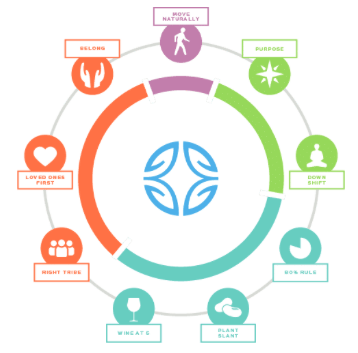
Features of blue zones
The Blue Zones project outlines specific diets from each region:
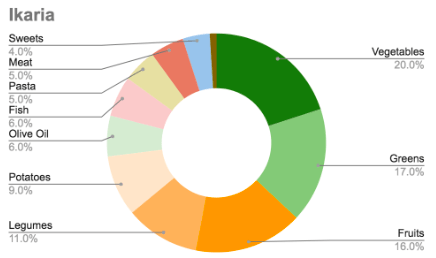
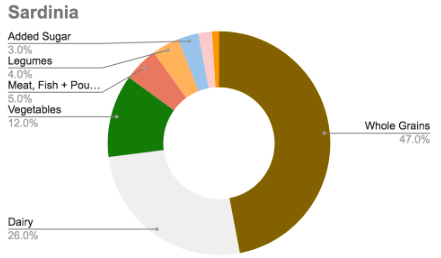
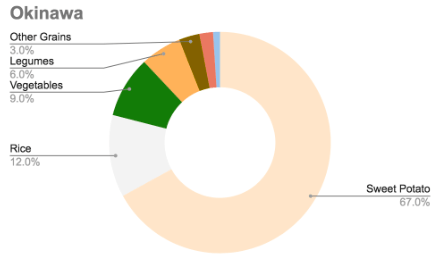
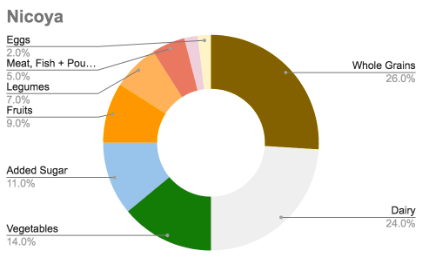
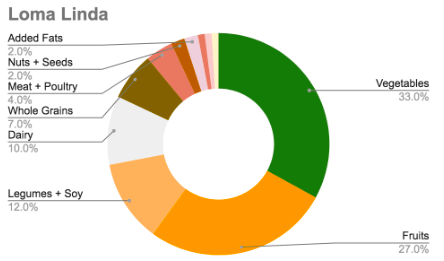
Blue Zone diets centre around fruits and vegetables, legumes, whole grains and nuts. Residents consume fish and dairy in moderation, and only occasionally eat meat.
Diet
Fruits, vegetables, whole grains, tea and wine are rich sources of polyphenols. Polyphenols are a group of chemical compounds with antioxidant properties, mainly found in plant-based foods. Antioxidants play a vital role in maintaining oxidation balance. Oxidation occurs in our bodies when free radicals react with other molecules. Free radicals are highly reactive, oxygen-containing molecules. They help our immune system ward off pathogens that provoke infection. Antioxidants stabilise free radicals by donating an electron, thereby maintaining an oxidation equilibrium. Oxidative stress occurs as a result of an imbalance between free radicals and antioxidant defence. This can cause damage to fatty tissue, proteins and DNA. The body contains naturally occurring antioxidants, but adding antioxidant-rich foods to diets prevents degenerative diseases – cancer, cardiovascular diseases and neurodegenerative diseases such as Alzheimer’s or Parkinson’s.
Blue Zone residents also benefit from indigenous food.
Ikarians follow a variant of the Mediterranean Diet. A 2014 study estimates that exposure to the Mediterranean diet reduced risk of cardiovascular disease by 30%. A diet high in unsaturated fats and antioxidants can prevent diabetes and aid in management of metabolic syndrome in individuals. Metabolic syndrome refers to a group of conditions that simultaneously occur, elevating your risk of heart disease, stroke and type 2 diabetes. Conditions include increased blood pressure, high blood sugar, excess body fat around the waist, and abnormal cholesterol or triglyceride levels.
Sardinians’ high dairy consumption is attributable to sheep and goats milk, which contains more calcium, protein and nutrients than traditional cow milk. Whole grain consumption consists of barley, rich in fibre, vitamins and minerals. Sardinians also follow a slightly modified version of the Mediterranean Diet:
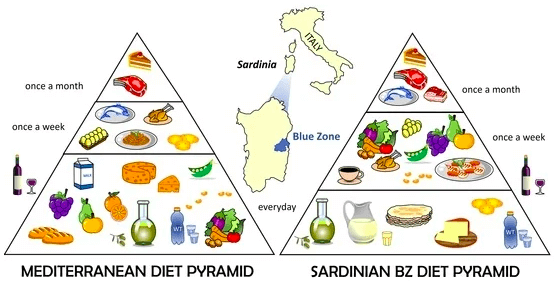
Okinawans eat an abundance of sweet potatoes. Sweet potatoes contain potassium (linked to heart health), fibre and beta-carotene (an antioxidant). A study by Ludvik et al revealed that consuming sweet potatoes improved insulin sensitivity in type 2 diabetes patients. Okinawan women may benefit from the presence of soy in their diet. Soy contains isoflavones, a type of plant estrogen. Osteoporosis, common in menopausal women, occurs due to an estrogen deficiency. Studies reveal that consumption of soy diminished bone loss in pre-menopausal women. More evidence is needed to ascertain the benefits of soy.
Nicoyans’ primary grain is corn – they eat corn tortillas, black beans and rice daily. Corn is packed with vitamins and minerals, antioxidants and dietary fibre. Consumption of whole grain corn reduces risk of chronic diseases such as cardiovascular disease, type 2 diabetes and improves digestive health. A majority of locals drink coffee everyday, and long term benefits include a reduced risk of liver cirrhosis, gout, and type 2 diabetes. Ikarians and Sardinians are also avid coffee drinkers. Read our blog on coffee and blood glucose here.
In a demographic study of the Seventh-day Adventists, around 45% identified as vegetarian. Vegetarian status is defined as not consuming flesh foods. Studies reveal that such dietary patterns are associated with lower body mass index (BMI) and lower prevalence of diabetes, metabolic syndrome, mortality, hypertension and cancer. Adventists also snack on nuts. Consumption of nuts protects individuals from ischemic heart disease, according to a study by Sabate.
Nieddu et al compare dietary habits between populations in the Nicoya Peninsula (NYC) and Ogliastra, Sardinia (SAR):
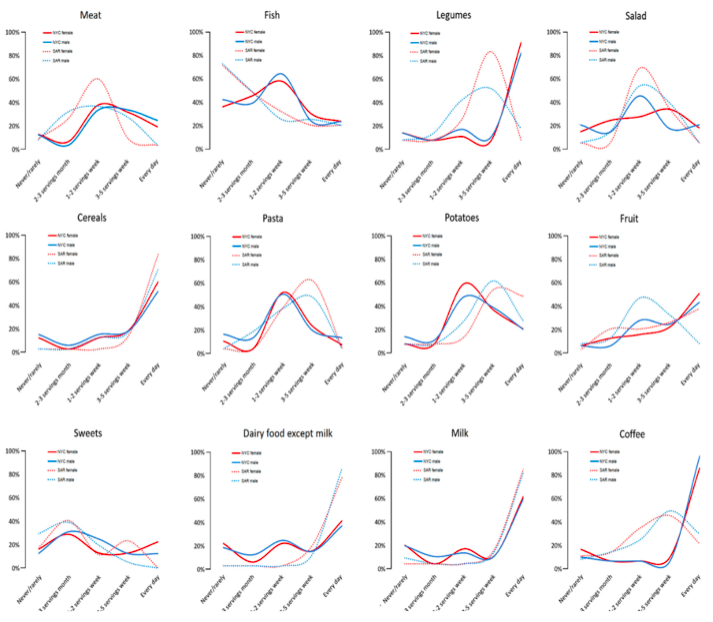
Of particular interest is the preference of legumes and fish over meat. High in saturated fats, red meat and processed meat consumption is linked to a higher incidence of metabolic syndrome and hyperglycemia. Replacing red or processed meat with white meat, fish, eggs or legumes reduces the risk of metabolic syndrome.
Minimal ingestion of sweets is also apparent from the Nieddu study. Blue Zone inhabitants limit their consumption of sugars and processed foods. Excess sugar is metabolised by the liver the same way as alcohol, converting dietary carbohydrates to fat. Accumulation of fat over time can lead to fatty liver disease, diabetes and eventually heart disease. Learn more about sugar and its effect on your metabolism here.
Calorie restriction
In Japan, “Hara Hachi Bu” loosely translates to “fill your belly to 80 percent.” blue zone residents follow this practice – rather than burden the body with long digestive processes that accelerate cellular oxidation. Wilcox et al studied calorie restriction in Okinawans aged 65 or older, to find that they exhibit low BMI, little weight gain with age, and low risk of mortality from age-related diseases.
Ikarians are Greek Orthodox Christians – a religion that fasts multiple times per year. A study on the effects of fasting versus normal nutrient intake, revealed Ikarians who fasted had lower cholesterol and BMI. In a study of mice, a ‘fasting’ diet decreased biomarkers for aging, diabetes, cardiovascular disease and cancers.
Another characteristic of residents of blue zones is they eat light, early dinners. Bandin et al concluded that late eating is associated with decreased glucose tolerance, carbohydrate oxidation and resting energy expenditure. Salivary bacteria impact the intestine and are correlated with intestine inflammatory diseases and Crohn’s disease. An investigation into the salivary microbiota revealed that late eating inverts their daily rhythm, which may have a detrimental effect on one’s metabolism. Several studies document the association between late dining and hyperglycemia, metabolic syndrome and obesity.
Alcohol consumption
With the exception of the Seventh Day Adventists of Loma Linda, blue zone inhabitants drink in moderation during the week. The mediterranean diet prescribes up to two glasses of wine per day for men and one glass for women. In a study, red wines were observed to have especially high levels of phenols and flavonols (types of Polyphenols) over white wine. The moderate action of bioavailable vitamins C, E and β-carotene plays a role in the beneficial effects of red wines over white wines. A regular intake of red wines, instead of the white counterparts is recommended, in moderation, in alignment with the study. Cannonau red wine from Sardinia also contains high amounts of phenolic acids and flavonoids.
Numerous studies explore the relationship between alcohol consumption and mortality. Research suggests drinking less than one drink per day (100 g per week) is associated with the lowest risk of death.
Physical activity
Blue zone dwellers stay incredibly active throughout their lives. Their preferred mode of transportation is walking. In Okinawa, residents take up gardening to grow vegetables and remain mobile. Additionally they practice tai-chi, an ancient Chinese martial art. Residents of Nicoya enjoy physical chores, and remain physically active late into their lives.
Sardinia is home to the world’s longest-lived men. Sardinian shepherds walk over five miles a day on mountainous terrain. A study by Pes et al identified that their occupational activity and the geographic characteristics of the area are important factors in explaining Sardinian longevity.
An investigation of elderly Ikarians revealed that habitual physical activity is associated with improved endothelial function (blood vessels, heart & lymphatic systems) and increased total antioxidant capacity.
Studies show a link between physical activity and improved cardiovascular and metabolic health biomarkers. Increased physical activity is characterised by triglyceride reduction, lipoprotein increase and decrease in coronary artery calcium.
Learn more about physical activity and its effect on your metabolic health here.
Purpose
Nicoyans call it Plan de Vida. In Japan, it’s known as Ikigai. Ikigai means “ a life worth living”. It provides Okinawans with a sense of purpose, self worth and a reason to wake up everyday. The Japanese view Ikigai as indispensable to well-being. People may find Ikigai in one or more areas of life, such as work, family or communication with neighbors.
Okamoto & Tanaka surveyed elderly residents of Japan to discover that “subjective usefulness” is important in enhancing survival in the elderly population. Toshimasa et al found that a lack of a sense of ikigai was associated with an increased risk of mortality. A study by Cohen et al, surmised that possessing a higher sense of purpose is linked to a reduced risk for cardiovascular disease and mortality.
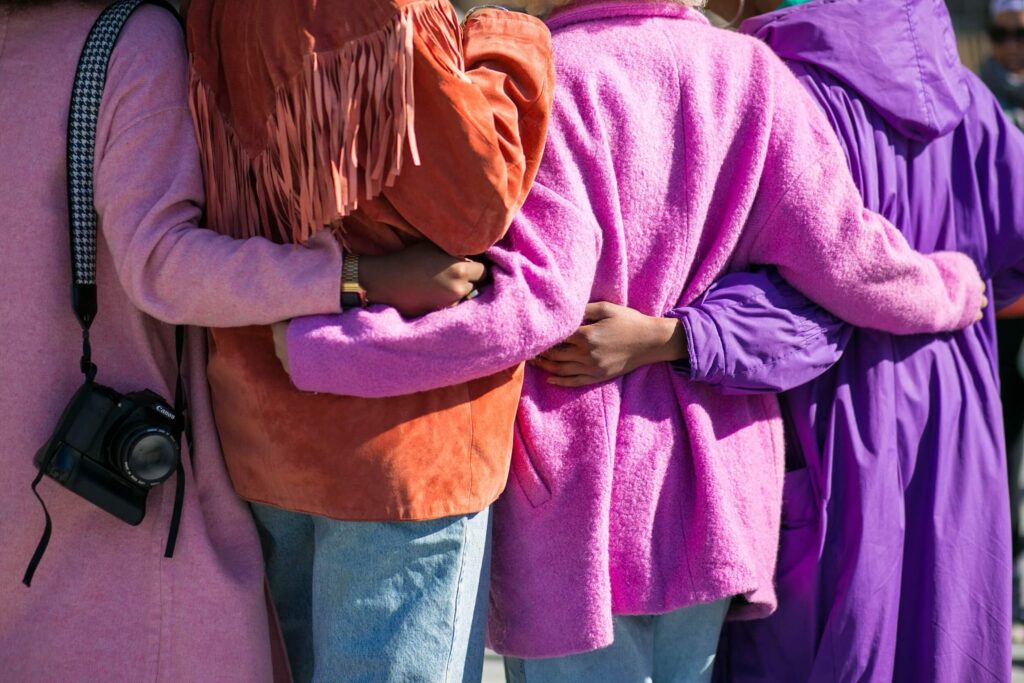
Community / family
Common to all Blue Zones is a value placed on elders and family. Grandparents usually live with their families, and provide love, childcare, financial help and wisdom. Families are tight-knit and provide a sense of purpose and belonging.
A Sardinian study revealed that socio-cultural context is a highly significant factor in self-reported well being. Members of the Sardinian blue zone reported high levels of satisfaction with life and family ties. Elder Sardinians are encouraged to play an active role in the community as they impart local traditions, cultural values and social support. It concludes that social engagement is a determinant in mental health and positive aging (healthy ageing).
In Okinawa, a moai is a social network forged by friends.This social support group, meets social, financial, health and spirituality needs of individuals. . This sense of participation and community promotes well being and active aging.
A study by Kamei et al, reveals that a majority of elderly Japanese residents possessed Ikigai. Consequently, residents were more likely to participate in community support activities for the elderly, children and the disabled.
Stress
Stress is not necessarily bad in small amounts – it’s called eustress. Stress induces survival behavior, motivation and positive striving. Chronic stress is linked to inflammation, cell damage(accelerates aging) and higher mortality. Studies suggest that developing a level of resistance to stress is often related to longevity.
Even blue zone residents are not immune to stress. Crucially however, they have methods to alleviate their stress. Okinawans tend to their gardens and pay homage to their ancestors each day. Sardinians have a happy hour from 5 to 8pm. Seventh-day Adventists observe Sabbath for 24 hours a week; an opportunity to relieve stress and connect with nature.
Read more about stress and its impact on your metabolism here.
Spirituality
Research suggests that most Blue Zone residents belong to a faith-based community. A study of people over 90 years old living in Ikaria revealed that 90% believed in God, and over 80% participated in religious events.
While studies stop short of stating the effect of spirituality on physical health, its effects on mental health are apparent. An example is the Seventh-day Adventists of Loma Linda. Lee et al attempt to investigate the association of mental and physical health with religion or spirituality. They found that Seventh-day Adventists reported better physical and mental health than national US norms. An inherent weakness of the study is that participants were exclusively Seventh-day Adventists, a unique sample anyway due to their longevity.
Okinawans believe that everything has its own spiritual energy. Every year in April, Okinawa families gather at the tombs that contain the remains of their ancestors. Some of the tombs date back many years and are sculpted like the backs of turtles. They hold the bones of generations of ancestors. They talk to their ancestors as if they were in the present. This creates a sense of continuity.
Conclusion
Blue zones are regions on earth where people live the longest. Much can be learnt from the centenarians and supercentenarians of the Blue Zones. Research suggests that environmental factors contribute to the residents’ longevity. We can all make changes to our lifestyle that mirror the Blue Zone way of life. A shift to a plant-based diet of antioxidant-rich foods wards off heart disease and diabetes. Low calorie intake reduces metabolic load and contributes to low BMI. Here, alcohol is consumed in moderation, with red wine being the preferred choice for its antioxidant properties. Staying physically active is paramount; blue zone residents don’t go to gymnasiums – instead they walk everyday and have improved cardiovascular health. A sense of Ikigai or purpose, fuels the inhabitants with a sense of purpose. Ikigai is correlated with lower mortality. Residents also have effective ways of coping with stress – a factor that contributes to aging. They value elders and relationships with family & friends and participate keenly in the wider community. Finally, they largely belong to a faith, linked to greater life satisfaction. These tenets of blue zones serve as lessons in longevity from the world’s oldest people.
The contents of this article are for general information and educational purposes only. It neither provides any medical advice nor intends to substitute professional medical opinion on the treatment, diagnosis, prevention or alleviation of any disease, disorder or disability. Always consult with your doctor or qualified healthcare professional about your health condition and/or concerns and before undertaking a new health care regimen including making any dietary or lifestyle changes.
References



